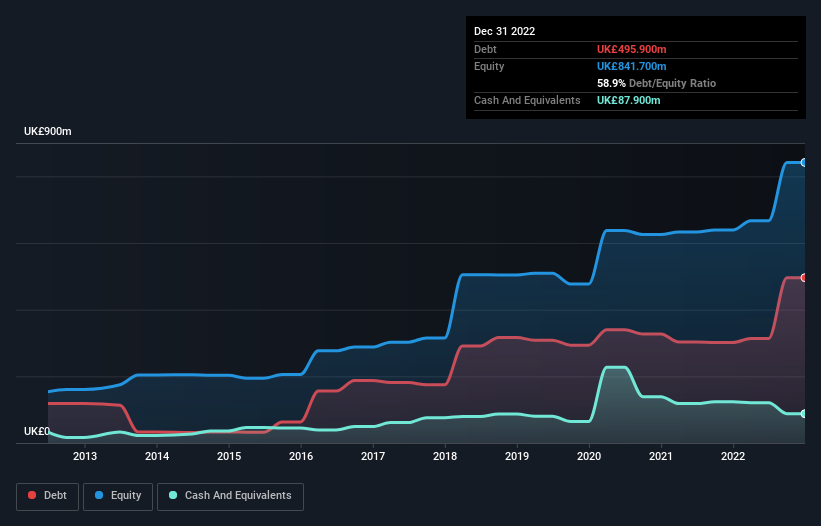- United Kingdom
- /
- Pharma
- /
- LSE:DPH
Dechra Pharmaceuticals (LON:DPH) Takes On Some Risk With Its Use Of Debt

David Iben put it well when he said, 'Volatility is not a risk we care about. What we care about is avoiding the permanent loss of capital.' When we think about how risky a company is, we always like to look at its use of debt, since debt overload can lead to ruin. Importantly, Dechra Pharmaceuticals PLC (LON:DPH) does carry debt. But the real question is whether this debt is making the company risky.
When Is Debt Dangerous?
Generally speaking, debt only becomes a real problem when a company can't easily pay it off, either by raising capital or with its own cash flow. In the worst case scenario, a company can go bankrupt if it cannot pay its creditors. While that is not too common, we often do see indebted companies permanently diluting shareholders because lenders force them to raise capital at a distressed price. Of course, debt can be an important tool in businesses, particularly capital heavy businesses. The first thing to do when considering how much debt a business uses is to look at its cash and debt together.
See our latest analysis for Dechra Pharmaceuticals
What Is Dechra Pharmaceuticals's Debt?
The image below, which you can click on for greater detail, shows that at December 2022 Dechra Pharmaceuticals had debt of UK£495.9m, up from UK£301.4m in one year. However, it also had UK£87.9m in cash, and so its net debt is UK£408.0m.

How Strong Is Dechra Pharmaceuticals' Balance Sheet?
We can see from the most recent balance sheet that Dechra Pharmaceuticals had liabilities of UK£168.4m falling due within a year, and liabilities of UK£734.2m due beyond that. Offsetting these obligations, it had cash of UK£87.9m as well as receivables valued at UK£147.6m due within 12 months. So its liabilities total UK£667.1m more than the combination of its cash and short-term receivables.
Of course, Dechra Pharmaceuticals has a market capitalization of UK£3.82b, so these liabilities are probably manageable. However, we do think it is worth keeping an eye on its balance sheet strength, as it may change over time.
In order to size up a company's debt relative to its earnings, we calculate its net debt divided by its earnings before interest, tax, depreciation, and amortization (EBITDA) and its earnings before interest and tax (EBIT) divided by its interest expense (its interest cover). Thus we consider debt relative to earnings both with and without depreciation and amortization expenses.
Dechra Pharmaceuticals has a debt to EBITDA ratio of 3.1 and its EBIT covered its interest expense 6.4 times. Taken together this implies that, while we wouldn't want to see debt levels rise, we think it can handle its current leverage. The bad news is that Dechra Pharmaceuticals saw its EBIT decline by 18% over the last year. If earnings continue to decline at that rate then handling the debt will be more difficult than taking three children under 5 to a fancy pants restaurant. There's no doubt that we learn most about debt from the balance sheet. But ultimately the future profitability of the business will decide if Dechra Pharmaceuticals can strengthen its balance sheet over time. So if you're focused on the future you can check out this free report showing analyst profit forecasts.
Finally, while the tax-man may adore accounting profits, lenders only accept cold hard cash. So we always check how much of that EBIT is translated into free cash flow. In the last three years, Dechra Pharmaceuticals created free cash flow amounting to 20% of its EBIT, an uninspiring performance. That limp level of cash conversion undermines its ability to manage and pay down debt.
Our View
We'd go so far as to say Dechra Pharmaceuticals's EBIT growth rate was disappointing. Having said that, its ability to cover its interest expense with its EBIT isn't such a worry. Once we consider all the factors above, together, it seems to us that Dechra Pharmaceuticals's debt is making it a bit risky. That's not necessarily a bad thing, but we'd generally feel more comfortable with less leverage. The balance sheet is clearly the area to focus on when you are analysing debt. However, not all investment risk resides within the balance sheet - far from it. These risks can be hard to spot. Every company has them, and we've spotted 4 warning signs for Dechra Pharmaceuticals (of which 1 is significant!) you should know about.
Of course, if you're the type of investor who prefers buying stocks without the burden of debt, then don't hesitate to discover our exclusive list of net cash growth stocks, today.
New: Manage All Your Stock Portfolios in One Place
We've created the ultimate portfolio companion for stock investors, and it's free.
• Connect an unlimited number of Portfolios and see your total in one currency
• Be alerted to new Warning Signs or Risks via email or mobile
• Track the Fair Value of your stocks
Have feedback on this article? Concerned about the content? Get in touch with us directly. Alternatively, email editorial-team (at) simplywallst.com.
This article by Simply Wall St is general in nature. We provide commentary based on historical data and analyst forecasts only using an unbiased methodology and our articles are not intended to be financial advice. It does not constitute a recommendation to buy or sell any stock, and does not take account of your objectives, or your financial situation. We aim to bring you long-term focused analysis driven by fundamental data. Note that our analysis may not factor in the latest price-sensitive company announcements or qualitative material. Simply Wall St has no position in any stocks mentioned.
About LSE:DPH
Dechra Pharmaceuticals
Dechra Pharmaceuticals PLC develops, manufactures, regulates, markets, and sells veterinary pharmaceuticals and related products for veterinarians.
Reasonable growth potential and overvalued.


